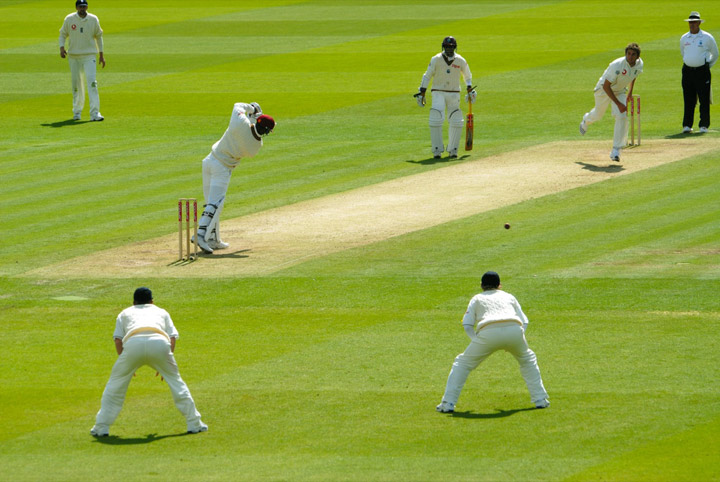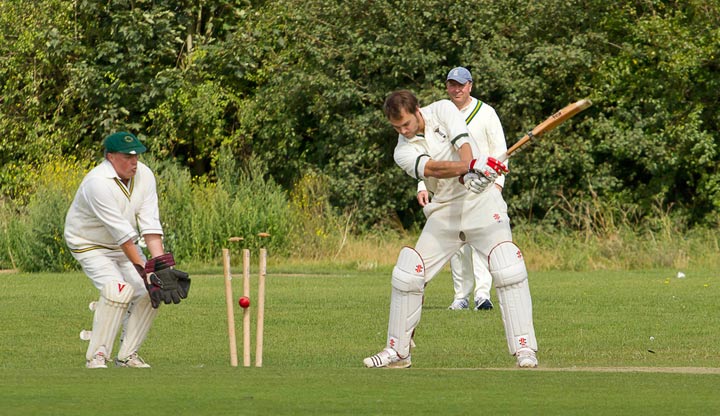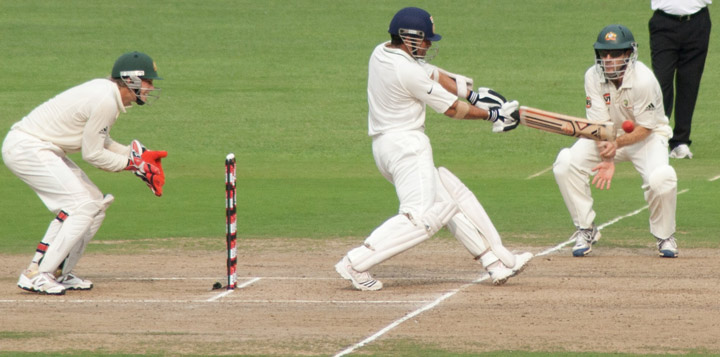One of the biggest sporting events on the planet is coming up in the next couple of months, and you probably didn’t have a clue. The world’s estimated 2.5 billion cricket fans, however, are excited.

The world’s second most popular sport is played on every continent, in almost every country colonised by Britain (not including those where “hockey” is a sport that requires ice). The home side at this year’s World Cup – Australia – are hot favourites to win, although nobody is counting out South Africa, defending champions India or co-hosts New Zealand.
What you need to know about cricket
If you didn’t grow up with cricket, it may appear baffling and even a little boring, but a third of the world’s population can’t be wrong, can they?
The aim of the game is to score runs: a bowler delivers the ball to the batsman who attempts to hit the ball with his bat away from the fielders so he can run to the other end of the pitch and score a run. The batsman is “out” if his shot is caught, or if the bowler knocks the “bails” (two little pieces of wood) off the “stumps” (three sticks in the ground behind the batsman), or if he blocks a ball with his leg that would have otherwise hit the stumps. So those are the basics.
There are various ways to play cricket, ranging from Twenty20 matches which last around three hours to test matches which take a number of days. This year’s world cup is “one day cricket”, which is probably the most popular format. Each match lasts a day, including lunch and afternoon tea break.
Cricket culture
From the outside, cricket appears to be the most gentlemanly of all sports. During train journeys through the most traditional parts of England, you may well spot a game taking place on some peaceful village green, like a scene from another century.

While cricket is certainly more civilised than many sports, you might be shocked at what the players are saying to each other. “Sledging” is the practice of insulting your opponents, trying to upset them to the point where they lose focus. Australians are the acknowledged masters of the art, and the smarter the insults, the better. The best enter cricketing folklore.
For example, Pakistan’s Javed Miandad called Aussie legend Merv Hughes a “fat bus driver” during a 1991 test match. Hughes bowled Miandad out shortly afterwards and, when running past him, said with a smile, “tickets please”.
Other legends include the 52 cans of beer consumed by Australia’s David Boon on a flight from Sydney to London in 1989.
But even the sledging is comparatively polite when compared with other sports. Former cricketer Rod Marsh said, “We were always aware that references to wives, girlfriends, mothers, etcetera were verboten.”
Scandals
There have been some controversies around the game in recent years, ranging in severity from ball tampering – roughing up one side of the leather ball to affect the way it flies – to systematic match fixing by shadowy betting syndicates.
One of the most famous incidents was in 1981 when a match between Australia and New Zealand came down to the last ball. New Zealand needed to score six runs, which would only have been possible by hitting the ball over the boundary without it touching the ground. The Australian bowler rolled the ball slowly along the ground making six runs impossible.
The Prime Minister of New Zealand described it as “the most disgusting incident I can recall in the history of cricket” and “an act of true cowardice”.
Most of the scandals around the game involve players with too much energy and free time, overenthusiastically using their “middle stumps” while on tour.
Legendary players

Some of the greatest cricketers of all time are Muttiah Muralitharan (Sri Lanka), Sachin Tendulkar (India), Wasim Akram (Pakistan), Viv Richards (West Indies), Ian Botham (England) and Don Bradman (Australia).
If you are unsure which to proclaim the greatest, simply check which country you are in and choose the name that corresponds with that country. Be careful not to suggest an English name while in Australia, Pakistani name while in India, and so on.
Cricket vocabulary
Duck – being bowled out without getting any runs.
Howzat? – really “how’s that?” when players try and convince the umpire that a batsman is “out”.
Innings – one player’s, or team’s, turn to bat.
“It’s just not cricket” – When something is unsportsmanlike or unfair (normally used outside of cricket).
LBW – Leg before Wicket, when a batsman uses his leg to stop the ball hitting the stumps.
Over – six consecutive balls by one bowler.
Stumps – the sticks defended by the batsman. They have cameras in them nowadays.
Wicket – a set of stumps and bails or the pitch or the dismissal of a batsman.
World Cup: when and where?
The ICC Cricket World Cup runs from Feb 14th until Mar 29th 2015 at venues across Australia and New Zealand. The final takes place in Melbourne.
Who to cheer for
Afghanistan have qualified for this year’s tournament, having only formed a national team in 2001. They are unlikely to win, but are sure to receive a warm reception.
Have you ever played cricket? Or consumed 52 beers during a flight? You can share your experiences in the comments!
Image credits: John Turner (CC BY 2.0) Edd’s Images (CC BY 2.0) Pulkit Sinha (CC BY-SA 2.0)

